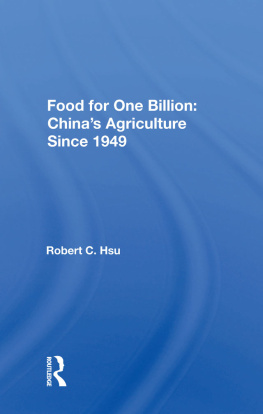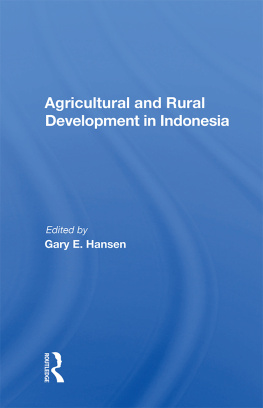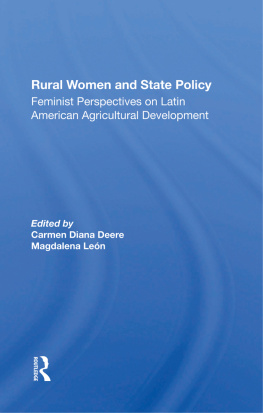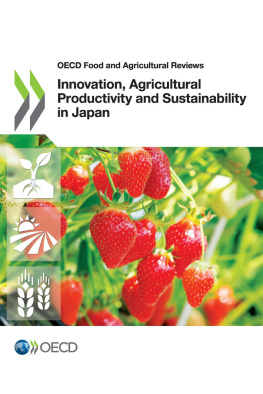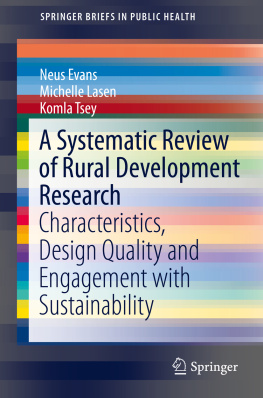SUSTAINABILITY IN AGRICULTURAL AND RURAL DEVELOPMENT
Dedicated to our parents, who represent the previous generation and generations long gone
and to our children who represent the next generation and generations yet to come
First published 1998 by Ashgate Publishing
Reissued 2018 by Routledge
2 Park Square, Milton Park, Abingdon, Oxon, 0X14 4RN
52 Vanderbilt Avenue, New York, NY 10017
Routledge is an imprint of the Taylor & Francis Group, an informa business
Copyright Gerard E. DSouza and Tesfa G. Gebremedhin 1998
All rights reserved. No part of this book may be reprinted or reproduced or utilised in any form or by any electronic, mechanical, or other means, now known or hereafter invented, including photocopying and recording, or in any information storage or retrieval system, without permission in writing from the publishers.
Notice:
Product or corporate names may be trademarks or registered trademarks, and are used only for identification and explanation without intent to infringe.
Publishers Note
The publisher has gone to great lengths to ensure the quality of this reprint but points out that some imperfections in the original copies may be apparent.
Disclaimer
The publisher has made every effort to trace copyright holders and welcomes correspondence from those they have been unable to contact.
A Library of Congress record exists under LC control number: 97051331
ISBN 13: 978-1-138-34610-9 (hbk)
ISBN 13: 978-1-138-34611-6 (pbk)
Chapter 1
Chapter 2
Chapter 3
Chapter 10
Chapter 2
Chapter 3
Chapter 4
Chapter 7
Chapter 10
A precise, consensus definition of sustainable development is illusive, however most advocates recognize three interrelationships as crucial to the goals of sustainable development. These are the relationships embedded in economic systems, ecological systems, and socio-cultural systems. The concept of sustainable development, at least as labeled as such, appears to have begun in the United Nations in the mid-1960s, and it has since gained prominence as a central feature of the United Nations development environmental philosophy.
Most view the key criterion of sustainable development as that provided by the so-called Brundtland Reportthe 1987 World Commission on Environment and Development. That is, sustainable development meets the needs of the current generation without compromising the ability of future generations to meet their needs. Sustainable development includes the sustainability of agricultural systems and agro-ecological integrity. However, much of the agricultural systems analysis has been directed at the difficulties of protecting ecosystems in the face of expanding agriculture in the developing world.
While the concept of sustainable development was gaining supporters, a parallel but apparently independent evolution was occurring with respect to the concept of sustainable agriculture. In the developed nations, starting around the 1970s, there began a reaction to chemically dependent, large-scale, commercial agriculture. This reaction was propelled further by cost-price squeezes in North American and European commercial agriculture that periodically created farm crisis situations and threatened the incomes and futures of smaller scale family farms.
The search for alternatives to commercial agriculture harbored many names; including alternative agriculture, low-input agriculture, biological agriculture, and organic agriculture, as well as sustainable agriculture. While some adherents considered sustainable agriculture to only be a set of substitute technologies to commercial agriculture practices, others offered sustainable agriculture as an alternative belief system to that underlying commercial agriculture. As an alternative belief system, sustainable agriculture tended to emphasize reduced chemical use, family and group self-reliance, a global village view of the world, a respect for nature and ecosystems, a high value on the family farm, and voluntary simplicity. Similar to sustainable development concepts, sustainable agriculture concepts provided a more holistic philosophy that emphasized systems and connections, and tended to eschew reductionist thinking and analysis. With this holistic philosophy, multi-disciplinary systems-based science was considered essential to creating a new understanding and a new set of appropriate technologies for agriculture.
Oddly, many are just beginning to recognize that the two emerging philosophies of sustainable development and sustainable agriculture have much in common. The nuances of that recognition are just beginning to be explored. That this volume is dedicated to that exploration is refreshing and overdue. The book explores, from many disciplinary perspectives, the definitional difficultieswhat is sustainable agriculture and rural development? It then goes on to explore the most challenging question of how do we get there from here?. Much of this latter exploration is appropriately offered as an exploration in the related question of What makes people make the choices that they do? Since the answer to that question includes gender differences, cultural differences, domestic and trade policy incentives, land markets and tenure arrangements, personal characteristics, available technologies, the costs of information, the nature of adaptive learning and the like the volume is of necessity, suggestive rather than conclusive. Yet, its multidisciplinary nature and its breadth are most welcome.
Since World War II, our concerns with natural resource use have broadened from that of quantitative adequacy to the sustainability of systems functioning. There is increasing recognition that economic growth, as conventionally defined, will not necessarily assure ecosystem integrity, broad improvements in the well being of all peoples, or obtainment of justice. The choice of our future development path requires informed judgments, wise policy, and wise investments Multidisciplinary contributions such as this one are fundamental to this choice.
Sandra S. Batie
Elton R. Smith Professor in Food and Agricultural Policy
Michigan State University
In a world where growth and development often come at the expense of resource degradation, it is imperative to understand the nature of this degradation and explore possible solutions. The preferred approach to development is one that is sustainable. However, the path to sustainable development is neither obvious nor simple; for one thing, sustainability has many, interrelated, components. This book examines the links between sustainability and various other topics, in the process exploring and integrating many of the components. Thus, our purpose is to provide a broad but in-depth discussion of the issues, concepts, methods of analysis, and empirical results related to the sustainable development of agriculture and rural communities.
Ideal for a seminar course, the book is intended for undergraduate and graduate students studying production agriculture, rural sociology, economics and public policy, environmental sciences, geography and land use planning, and other social sciences. It can serve as a source of information for policy makers. It can also be used as a reference by professional economists and other researchers interested in issues relating to sustainable agricultural and rural development. While the coverage of some topics is, by necessity, more technical, the book is compiled with a general audience in mind. Thus, it should be of interest to anyone concerned with agriculture and rural issues, particularly as they relate to the future of agriculture and of rural communities.



